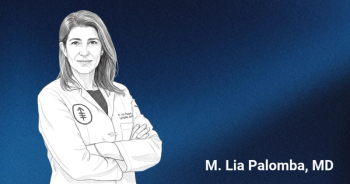
Patient Selection Based on the ECHELON-1 Study in cHL
Jonathon B. Cohen, MD, MS:Fortunately, we have now 2 very good options for patients with classical Hodgkin lymphoma [cHL], and it really comes down to the individual patient to decide which option is most appropriate. So for any patient that I see where I’m concerned at all about the possibility of lung toxicityso this would include patients with a history of asthma, patients that have a smoking history, or some other pulmonary condition—I almost always try to avoid bleomycin. And similarly, for patients that have an increased risk for neuropathy or potentially an increased risk for infection, I might be hesitant to use brentuximab vedotin.
In patients, though, that have neither of these comorbidities and where I really feel that they’re a good candidate for both approaches, I often talk about, with patients, about the fact that the brentuximab vedotin does appear to have an improved modified progression-free survival. In addition, at this year’s ASH [American Society of Hematology] meeting, we saw some longer-term follow-up from the ECHELON-1 study, including looking at the more standard progression-free survival endpoint. And based on this improvement, although modest, I feel that it’s reasonable in many patients to offer them brentuximab vedotin plus AVD [doxorubicin (Adriamycin), vinblastine (Oncovin), and dacarbazine] [BVAVD].
In addition, those patients that have some particularly higher-risk features, like more advanced stage or extra nodal disease, might be a little bit more likely to benefit from the BVAVD as opposed to standard therapy. And for those reasons, I opted to pursue that with this particular patient.
So it’s very important for any patient on treatment to be monitored closely for the development of toxicity. Although these are outpatient regimens and generally well tolerated, there have been a number of complications identified. With BVAVD, one of the biggest challenges that we’ve seen has been actually infection related to low blood counts. So neutropenia is a well-described toxicity of brentuximab vedotin, as well as a combination chemotherapy. And in the ECHELON-1 study, they did identify several instances of neutropenia, as well as febrile neutropenia, for patients receiving this regimen. I typically do require all of these patients to receive growth factor support as a result of this risk if they’re going to receive BV plus AVD. And so that’s one of the things that I do to try to avoid those risks.
In addition, I screen all of my patients for neuropathy during the time that they’re on treatment, and then it’s also important to recognize that there are other sort of more standard chemotherapy-associated toxicities, including nausea and vomiting; anthracycline-associated mucocytes; and cardiomyopathy and so forth that need to be monitored.
Transcript edited for clarity.
A 22-Year-Old Woman With Stage IV Classical Hodgkin Lymphoma
History & Physical
- A 22-year-old female presented with right cervical nodes developing over several months
- Initially evaluated by her OB/GYN who recommended observation. She subsequently developed neck pain while drinking wine
- Referred for lymph node biopsy -> classical Hodgkin lymphoma
- Past medical history: unremarkable
- Social history: No tobacco use; occasional ETOH; Division 1 swimmer, NKDA
- Family History:
- Maternal grandfather Squamous cell cancer
- Maternal grandmother Melanoma
- Aunt Breast Cancer
- 2 healthy siblings
Laboratory Values
- WBC 19.8 (85% PMN’s)
- Hgb 12.0
- Plts 571
- ESR 30
- Cr 0.76
- Albumin 4.2
- HIV/Hepatitis Negative
Staging PET/CT
- Intrathoracic adenopathy
- R cervical 2.3 x 1.9 (SUV 9.3)
- L cervical 2.2 x 1.8 (SUV 8.8)
- Ant Mediastinum 4.8 x 2.9 (SUV 21.3)
- R axillary 2.8 x 2.8 (SUV 12.2)
- Spleen SUV 2.9 with normal size
- Diffuse uptake in the axial skeleton (SUVs 4.9-5.5)
- Mediastinum SUV 1.8 / Liver 2.4
Pathology
- Nodular sclerosis classical Hodgkin Lymphoma
- Per IHC, Hodgkin cells express CD30, CD15, PAX5 (weak); negative for CD3, CD20, CD45
Treatment:A(BV)VD x 6
- Interim PET/CT with Deauville 3
- Tolerated well with GCSF support


















